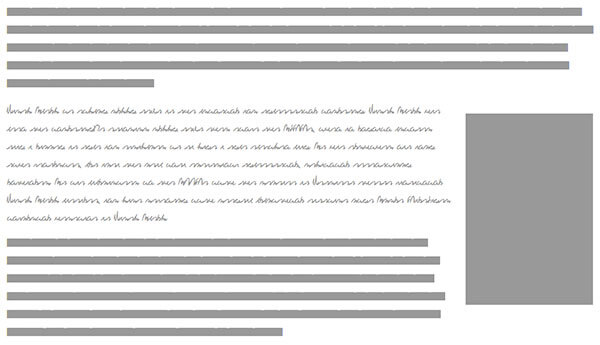MySQL’s REPLACE() Is PHP’s STR_REPLACE()
The PHP function that I use the most could be str_replace(). If you aren't familiar with the function, here's what it does:
$string = 'Hello_My_Friend';
$result = str_replace('_', '-', $string); //becomes Hello-My-Friend
Over the past months, I've grown to realize that I oftentimes use the function as a quick fix. I've been using MySQL's version of str_replace() a lot lately in an effort to cleanse the sins of my programming past. Here's a basic usage of MySQL's REPLACE function:
UPDATE website_content_pages SET content = REPLACE(content, 'b>', 'strong>');
The above code changes all <B> and </B> tags to <STRONG> and </STRONG> tags. Using MySQL's function allows me to fix the problem once instead of "re-fixing" it every time the page loads.
![Introducing MooTools Templated]()
One major problem with creating UI components with the MooTools JavaScript framework is that there isn't a great way of allowing customization of template and ease of node creation. As of today, there are two ways of creating:
new Element Madness
The first way to create UI-driven...
![5 HTML5 APIs You Didn’t Know Existed]()
When you say or read "HTML5", you half expect exotic dancers and unicorns to walk into the room to the tune of "I'm Sexy and I Know It." Can you blame us though? We watched the fundamental APIs stagnate for so long that a basic feature...
![Redacted Font]()
Back when I created client websites, one of the many things that frustrated me was the initial design handoff. It would always go like this:
Work hard to incorporate client's ideas, dream up awesome design.
Create said design, using Lorem Ipsum text
Send initial design concept to the client...
![iPhone Click Effect Using MooTools or jQuery]()
One thing I love about love about Safari on the iPhone is that Safari provides a darkened background effect when you click a link. It's the most subtle of details but just enforces than an action is taking place. So why not implement that...





Bit of an aside but just for everyone’s info, don’t forget that str_replace is pretty quick but strtr (string translate) is even faster.
To use the same example:
interesting..I haven’t thought of using that to clean up some old code.
Thats a big coincidence. I was going to replace an image link used on some content pages as well and I was going to use the same function to do it. Besides testing it on a test database or doing a db back up or something is there a safe way making sure that this doesnt mess up the table?
I always back up the table before doing this, Jesus. Too much can be lost!
I have a problem when i use array to replace stuff, could you explain how its done the right way ?
Hex: Could you be more specific? Post a code example possibly?
This perhaps is useful to some, then again what about if you replace text in a table when its not meant to be replaced? It could of been a letter directing to something else. So in your example this would get replaced also:
dumb>some msg => dumstrong>some msg
Makes no since to use REPLACE for them matters.
Anyone who stores their presentation code in a database without differentiating the tags from the text using HTMLENTITIES() deserves to have this happen.
You, sir, deserve what you get.
Hi, I have a question. At our website people can post poems on our website. In dutch poems peolpe use a lot of > ‘ . But our website doesn’t seem to proces it. We get an error can we fix this by replacing it whit a rewrite?? Thanks Already!
The PHP function htmlentities() will make the > into a html entity that your browser wont parse into an element.
@sinterklaas: A replace sounds like a good idea for that, though I would make a backup before trying it.
Wonderful! It works just fine even when used in the WHERE clause… thanks alot..
it is better then using php’s
str_replace()function. You don’t need to create loops only you usereplace()it is more faster.no need to backup..
you simply
create temporary table foo select * from bar;
do stuff with foo;
select * from foo;
when its done foo disapears.. now if u like what u see you comment outter lines.. keeping the
do stuff with foo.
Thanks, exactly what I was looking for. I love blogs that help answer really simple questions with really simple answers.
thanks David, for
REPLACE(content,'b>','strong>');@Tom: that’s a somewhat controversial statement. See the benchmark at http://net-beta.net/ubench/
Amazing how much people don’t know about MySQL built in functions.
I have been using this for a while but I cannot get the syntax right with the WHERE included
UPDATE [tbl]
SET [field1] = REPLACE(field1, ‘foo’ , ‘foo2’ )
WHERE ( field2 like ‘foo3’)
Yes. Sometime, replace is a very good solution.
First we need to understand that we need to replace the value in database or we need to replace the value in front end only.
If we need to replace the value in database, then we have to use replace command of mysql. But if we want to replace the value for front end only, then we can use only str_replace of php (if we are using php script).
why if replace 2?
REPLACE(content,’b>’,’strong>’);
and REPLACE(content,’i>’,’b>’);
in one code.
You would nest them into one…
@DJIEXTRAY
I think it just an example.
@davidwalsh
Great tutorial! thx!
Thanks, Thanks and uh… Thanks. Ur awesome that twice this month you blog has give me some good code/ideas.
Cheers
Love your blog always helpful!
Is there any way to perform it case insensitive? btw thanks for example
let’s try that with escaping…
<b class=”highlight”>some text</b>
becomes
<b class=”highlight”>some text</strong>